 Jun 9 2010, 07:36 AM Jun 9 2010, 07:36 AM
Post
#1
|
|
 Bảo vệ tổ quốc    Group: Năng Động Posts: 4,390 Joined: 5-August 09 Member No.: 4,332 Country 
|
 -------------------- Too much to read
Too little time |
|
|
|
 |
Replies
 Jun 9 2010, 07:43 AM Jun 9 2010, 07:43 AM
Post
#2
|
|
 Bảo vệ tổ quốc    Group: Năng Động Posts: 4,390 Joined: 5-August 09 Member No.: 4,332 Country 
|
Antonio Vivaldi 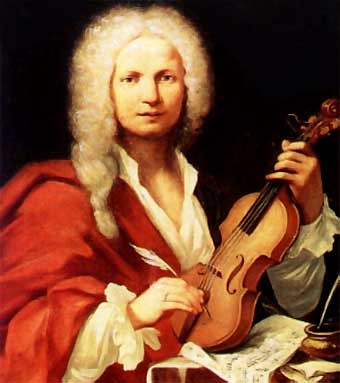 Lived: 1678-1741 Nationality: Italian Era: Baroque For many people, the name Vivaldi is associated with just one piece of music - Ie quattro stagioni (The Four Seasons) - which has been recorded countless times. But many other gems of Vivaldi's output are worth exploring: he was one of the most prolific and influential composers of his time, and without his contribution to the development of concerto form, the instrumental music of later composers such as Bach would have been the poorer. The Red Priest Vivaldi was born (during a minor earthquake) in Venice, to a baker turned professional violinist, with whom the young Antonio studied. In 1693 he began to train for the priesthood, while still living at home and continuing his violin studies. He was ordained in 1703, and his startling red hair earned him the nickname of i] prete rosso (the Red Priest), but the ecclesiastical life did not entirely suit him, and several times he found himself at odds with the church authorities. In the year of his ordination, Vivaldi was appointed violin teacher at the Conservatorio dell' Ospedale della Pied, a Venetian orphanage which housed and educated young girls. Music was held in high esteem there, and its reputation was such that many leading performers took part in its concerts. Vivaldi was required to teach and rehearse the students and to maintain the instruments. His initial appointment lasted six years, during which time he published a set of 12 trio sonate da camera and a set of solo violin sonatas. He had already begun to write concertos, which became his favourite medium. Vivaldi's concertos In all Vivaldi wrote well over 200 violin concertos, around 27 cello concertos, around a dozen for flute, three for piccolo, 20 for oboe, 37 for bassoon (an instrument for which few other composers have written concertos), and many more double and multiple concertos, of which the E minor concerto for four violins, Op. 3 No.4, is very well known. The fanciful titles of some of his concertos gave Vivaldi plenty of opportunity for descriptive writing. As well as the famous Four Seasons, programmatically depicting seasonal activities such as skating on the ice (winter), hunting (autumn), and listening to birdsong (spring), their titles include La tempesta di mare (Storm at Sea), ramoroso (The Lover), La caccia (The Hunt) and 11 corneto di posta (The Posthorn). A set of 12 concertos for one, two or four solo violins was published in Amsterdam in 1711 under the title r estro armonico, and instantly sold all over Europe (Bach made keyboard transcriptions of five of them). Another set of 12 (La stravasanza) appeared in 1714, and from then on Vivaldi's music was much in demand (the collection containing The Four Seasons was published in 1725). He also wrote around 60 concerti srossi for strings and bass. In 1711 Vivaldi returned to the Pied., where he took the opportunity to write sacred as well as instrumental music. His cheerful Gloria is still much performed today. He was associated with the institution until his death, although his frequent absences were not popular. He also began to write operas (about 45 in all) for various Italian courts and opera houses, including Mantua, Venice and Rome. Several have recently been revived, although interest still tends to be academic. Fall from grace Vivaldi spent much of the last two decades of his life on the move. Around 1725 he became involved with his singing pupil, Anna Giraud. The church authorities cannot have been pleased with the whiff of scandal surrounding the "Red Priest" and in 1737 he was censured for unpriestly conduct. In 1741 Vivaldi undertook a mysterious journey to Vienna (perhaps connected with Anna's work as an opera singer). He arrived on 28 June, and a month later he was dead, apparently of unknown causes. His arrogance and egotism had made many enemies, but his posthumous influence was immense. -------------------- Too much to read
Too little time |
|
|
|
 Jun 9 2010, 07:46 AM Jun 9 2010, 07:46 AM
Post
#3
|
|
 Bảo vệ tổ quốc    Group: Năng Động Posts: 4,390 Joined: 5-August 09 Member No.: 4,332 Country 
|
Johann Sebastian Bach 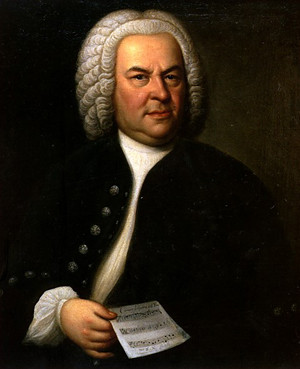 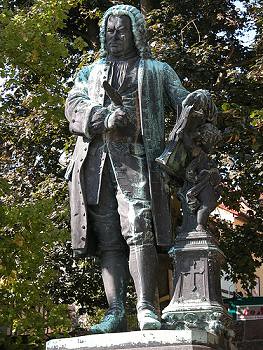 Lived: 1685-1750 Nationality: German Era: Baroque For many music-lovers, the music of J. S. Bach fulfills a profound spiritual need: it has a timeless, other-worldly quality which could only come from a composer who felt himself close to God. Just as Bach's birthplace was over- shadowed by the Wartburg mountain, topped by the fortress in which Martin Luther hammered out the fundamental principles of Protestant theology, so his life was dominated by his devotion to the Lutheran faith, and his music was dedicated to its service. Early years Unlike many of his more cosmopolitan contemporaries, Bach spent his entire career in Germany mostly in the central regions of Thuringia and Saxony. He was born into a long dynasty of Thuringian organists and composers who worked as church organists and choir-masters, municipal musicians, and at the many small princely or ducal courts which flourished in the region. Bach's father, Ambrosius, was himself employed as a musician by the town council of Eisenach, where Johann Sebastian was born on 21 March 1685. After losing both parents by the age of ten, Bach was sent to live at Ohrdruf with his married elder brother, Johann Christoph, who was organist there. It seems likely that Johann Christoph helped with his young brother's musical training, but once Johann Sebastian reached the age of 15, there was no longer room for him in the Ohrdruf household, and he obtained a free place at St Michael's. School in Luneburg, 320km (200 miles) away in north Germany. There he benefited from a solid musical education and sang in the choir, but his formal education came to an end in 1702. -------------------- Too much to read
Too little time |
|
|
|
 Jun 9 2010, 07:48 AM Jun 9 2010, 07:48 AM
Post
#4
|
|
 Bảo vệ tổ quốc    Group: Năng Động Posts: 4,390 Joined: 5-August 09 Member No.: 4,332 Country 
|
Joseph Haydn 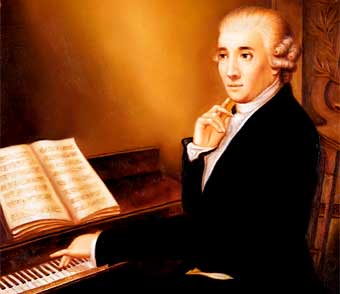 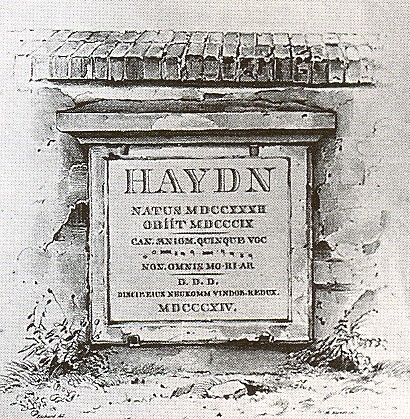 Lived: 1732-1809 Nationality: Austrian Era: Classical Joseph Haydn was the eldest and longest lived of the four great composers of the so-called "First Viennese School". Born when Bach and Handel were at the height of their fame, he outlived his friend Mozart by 18 years, and saw his former pupil Beethoven well established in his own career. It was Haydn who practically invented the Classical musical forms of symphony, concerto, string quartet and sonata. Mozart, Beethoven and Schubert all owed an incalculable debt to their genial, hard-working, predecessor. Haydn's life spanned a period of great social change. He was one of the last major musicians to work for a single aristocratic patron - in his case, the Hungarian Esterhazy family, whose seat was the castle of Eisenstadt, some 80km (SO miles) from Vienna. The arrangement worked quite well for Haydn - his employers treated him fairly - but in their eyes he was no better than a servant. His life-long desire for freedom was granted only towards the end of his long career. when he was effectively pensioned off and was able to travel and enjoy his spreading European reputation. -------------------- Too much to read
Too little time |
|
|
|
 Jun 9 2010, 07:53 AM Jun 9 2010, 07:53 AM
Post
#5
|
|
 Bảo vệ tổ quốc    Group: Năng Động Posts: 4,390 Joined: 5-August 09 Member No.: 4,332 Country 
|
Wolfgang Amadeus Mozart 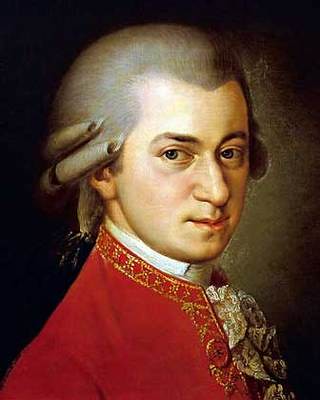 Lived: 1756-1791 Nationality: Austrian Era: Classical The works of Mozart and Beethoven stand at the heart of Western art music. Until the mid 20th century, Beethoven was perhaps the more revered as a heroic figure, battling against personal misfortune to produce his visionary and powerfully original music; while Mozart's music tended to be dismissed as "galant" and superficial. But over the past half-century, the re-evaluation of Mozart, together with the performance and recording of many of his lesser- known works, has revealed a composer of inestimable profundity and infinite variety, whose music has enriched the lives of performers and listeners alike. Family background The "miracle whom God let be born in Salzburg" made his appearance on 27 January 1756, the last of seven children born to Leopold Mozart and his wife Anna Maria, and one of only two to survive infancy. Leopold Mozart - a talented violinist, and the author of a successful treatise on violin technique - played in the court orchestra of the Archbishop of Salzburg, one of the most powerful prelates in Austria. Mozart's relationship with his father was central to his life. Leopold Mozart has been vilified as the archetypal domineering father, dragging his prodigiously talented son around the courts of Europe at an early age, not only subjecting him to the rigours of prolonged travel, but forcing him to display his skills on the keyboard to any bored aristocrat who would pay money to listen; then hectoring him when he grew older, trying to obstruct him from leaving a miserable existence in Salzburg for the excitements of Vienna, and interfering in his personal life. In fact, there is no evidence to suggest that Leopold was motivated by anything other than love and solicitude for his son. The Mozart family was very close, and their voluminous correspondence is full of protestations of affection. Leopold's only concern was for Wolfgang's well-being and success. He was one of the few people who fully recognized his son's unique gift, and he took every step to prevent it being squandered. Childhood At the age of four, Wolfgang began to study keyboard and composition with his father. Wolfgang's elder sister Maria Anna (Nannerl) was also a talented pianist, though once she reached adulthood, the conventions of the time obliged her to confine her talents to the domestic sphere. Leopold saw it as his duty to exhibit his exceptional children to the world. When they were six and 11 respectively, he took them to perform before the Elector of Bavaria at Munich, and the Empress Maria Theresa in Vienna. In 1763 the whole family undertook a trip to Paris and London, where Wolfgang played to both French and English monarchs. By this time he was already composing: four early keyboard sonatas were published in Paris, and he wrote his first symphonies in London. The family arrived back in Salzburg in November 1766. A further trip to Vienna failed to result in a hoped-for opera commission, but on returning home Mozart wrote one anyway, and La flnta semplice (The Pretend Simpleton) was performed at the Archbishop's palace in May 1769. Years of travel In December 1769 Leopold took Wolfgang to Italy for the first time. After visits to Milan, Florence, Rome and Naples, Mozart received his first opera commission. Mitridate, re di ponto was performed at Christmas 1770 at the Milanese court; but although both it and a further opera, Lucio Silla, were well received, Mozart's request for a job was turned down. Back in Salzburg, Mozart settled down reluctantly as Konzertmeister to the court orchestra of a new (and less tolerant) Archbishop, and continued to compose. In January 1775 he and his father travelled together for the last time, to Munich, for the performance of Mozart's comic opera, La finta aiardiniera (The Pretend Gardener). Two years later he asked for another period of leave, for an extended trip to Paris. The Archbishop promptly dismissed him, and Leopold, realizing that his own position was now in jeopardy, decided not to go. Mozart set out with his mother as chaperone. The trip was a disaster. After a prolonged stay in Mannheim, where Wolfgang fell madly in love with a young singer called Aloysia Weber, he was peremptorily ordered by Leopold on to Paris. There he found the sophisticated French capital totally uninterested in an unknown provincial composer, now too old to be interesting as a prodigy. Although the Paris experience did produce some fine works - the Paris Symphony (No. 31) and a concerto for flute and harp (both fashionable French instruments) - there was no financial gain and a severe loss, when Mozart's mother died suddenly. Saddened and disillusioned, Mozart returned home. Idomeneo For the next 18 months he buried himself in his official court duties, writing sacred music for the Salzburg court, as well as symphonies, serenades, the Sinfonia Concertante for violin and viola (inspired by the French model) and a double piano concerto for himself and Nannerl. Then, in the summer of 1780, he was commissioned to write a new opera for Munich, on the subject of Idomeneus, king of Crete. Idomeneo is Mozart's first great opera - the first in which he demonstrated his extraordinary talent for bringing characters to life, allowing them to express real human emotions through the medium of music. Vienna: early years After being feted in Munich, Mozart felt stifled by the petty humiliations of life in Salzburg. In March 1781 he was summoned to Vienna in the Achbishop's retinue, and took advantage of the rising antagonism between himself and his employer to engineer his own dismissal - albeit "with a box on the ear and a kick on the backside". To Leopold's dismay, Mozart announced his intention of remaining in Vienna, where he would teach, compose, and give concerts. It was a bold idea, but ultimately an unsuccessful one. Austria was at war with the Turkish Empire, money was short, and fashions ephemeral, but for a few years, Mozart's novelty value paid dividends. During his first year in Vienna he composed a group of three new piano concertos to play at his own subscription concerts, three magnificent wind serenades, and a new opera, Die Enifrihruna aus dem Serail (The Abduction from the Seraalio), with a German text and spoken dialogue (a type known as a Sinaspiel). Its success was marred only by the laconic remark of the emperor that it seemed to have "too many notes". Mozart also got married, much against his father's wishes. His bride, Constanze Weber, was the younger sister of his first love, Aloysia, who had turned him down. Constanze was an amateur singer: Mozart described her as "kind-natured...not ugly, but no beauty either". She has often been accused of ruining her husband's life by her bad housekeeping, but the accusation seems to have been unfounded, and the marriage - which produced two surviving sons (four other children died in infancy) - was very happy. When Leopold Mozart finally visited his son in 1785, he was much impressed with Wolfgang's fine apartment and high standard of living. -------------------- Too much to read
Too little time |
|
|
|
Posts in this topic
 vbx Những Vĩ Nhân Soạn Nhạc Jun 9 2010, 07:36 AM
vbx Những Vĩ Nhân Soạn Nhạc Jun 9 2010, 07:36 AM
 vbx Ludwig van Beethoven
Lived: 1770-1827
National... Jun 9 2010, 07:55 AM
vbx Ludwig van Beethoven
Lived: 1770-1827
National... Jun 9 2010, 07:55 AM
 vbx Franz Schubert
Lived: 1797-1828
Nationality: A... Jun 9 2010, 07:56 AM
vbx Franz Schubert
Lived: 1797-1828
Nationality: A... Jun 9 2010, 07:56 AM
 vbx Frederic Chopin
Lived: 1810-1849
Nationality: ... Jun 9 2010, 07:57 AM
vbx Frederic Chopin
Lived: 1810-1849
Nationality: ... Jun 9 2010, 07:57 AM
 vbx Franz Liszt
Lived: 1811-1886
Nationality: Hung... Jun 9 2010, 07:59 AM
vbx Franz Liszt
Lived: 1811-1886
Nationality: Hung... Jun 9 2010, 07:59 AM
 vbx Richard Wagner
Lived: 1813-1883
Nationality: G... Jun 9 2010, 08:00 AM
vbx Richard Wagner
Lived: 1813-1883
Nationality: G... Jun 9 2010, 08:00 AM
 vbx Johannes Brahms
Lived: 1833-1897
Nationality: ... Jun 9 2010, 08:02 AM
vbx Johannes Brahms
Lived: 1833-1897
Nationality: ... Jun 9 2010, 08:02 AM
 vbx Pyotr Ilyich Tchaikovsky
Lived: 1840-1893
Nati... Jun 9 2010, 08:04 AM
vbx Pyotr Ilyich Tchaikovsky
Lived: 1840-1893
Nati... Jun 9 2010, 08:04 AM
 vbx Gustav Mahler
Lived: 1860-1911
Nationality: Au... Jun 9 2010, 08:06 AM
vbx Gustav Mahler
Lived: 1860-1911
Nationality: Au... Jun 9 2010, 08:06 AM
 vbx Claude Debussy
Lived: 1862-1918
Nationality: F... Jun 9 2010, 08:08 AM
vbx Claude Debussy
Lived: 1862-1918
Nationality: F... Jun 9 2010, 08:08 AM
 vbx RE: Những Vĩ Nhân Soạn Nhạc Jun 9 2010, 08:11 AM
vbx RE: Những Vĩ Nhân Soạn Nhạc Jun 9 2010, 08:11 AM  |
| Lo-Fi Version | Time is now: 5th July 2025 - 03:11 AM |






